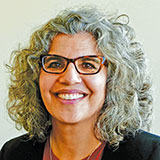The Fight Goes on for Educators and Students
The Fight Goes on for Educators and Students

Merrie Najimy,
President
Greetings,
I hope you are all safely weathering the first big snowstorm of the season. In this most unusual of years, I know that most of you will be working remotely rather than commuting or getting a snow day. Fortunately, the winter break is just around the corner. Hope is on the horizon, too, with the promise of the COVID-19 vaccine. But there still is a lot to do.
This was an active week for locals and the MTA, much of it centered around the Department of Elementary and Secondary Education and on the Board of Higher Education and our #DefendPublicHigherEd campaign. Here are some updates.
100+ Locals Vote “No Confidence” in Riley
As many of you know, more than 100 locals took a vote of “no confidence” in Commissioner Jeffrey Riley, and three local presidents presented the declaration at Tuesday’s Board of Elementary and Secondary Education meeting. Roger Nugent of Worcester, Deb Gesualdo of Malden and Anthony Parolisi of Haverhill spoke truth to power as they described the commissioner’s missteps, including failing to consult with educators before making policies; pressuring schools to reopen before it is safe; failing to advocate forcefully with the Legislature for funding needed to improve safety; and promoting MCAS testing – but not COVID-19 testing – in our schools. This grassroots effort was circulated through the MEAN networks and beyond. There will be a series of virtual convenings with local leaders and rank-and-file members at the start of the new year to plan the next steps.
Challenging Higher Ed Execs’ Misplaced Priorities
Staff, faculty and the newest student trustee spoke out to demand that colleges and universities stop the thousands of job cuts in public higher ed, bring back our members and restore student services. Union leaders spoke truth to power at the UMass Board of Trustees meeting; 1,800 students signed a petition opposing furloughs at Salem State University; and we released a new video ad exposing the impact of austerity budgeting. Higher ed activists will gather via Zoom on Monday, Dec. 21, to celebrate progress in 2020 and look ahead to contract and legislative campaigns for 2021. Meanwhile, we are urging legislators to override the governor’s veto of higher ed funding.
BESE Approves New Time-on-Learning Regs Over Educators’ Objections
Once again, without consulting with the MTA or AFT Massachusetts, and despite objections from school superintendents as well as from us, and in his typical style, Riley rammed through “emergency” regulations on Tuesday. And in its anti-democratic style, the BESE voted 7 to 4 to implement them immediately, then take public comment later. In a nutshell, the regulations favor quantity over quality, requiring 40 hours over 10 days of synchronous instruction in remote-learning districts and 35 hours in hybrid ones. According to DESE, about 30 percent of districts don’t meet these benchmarks and must start to do so. The “emergency” cited was to protect students’ mental health – but many see this as another attempt to force unions to renegotiate Memorandums of Understanding and comply with DESE’s will.
We are all worried about the mental health of our students. The problems are real, but they are not caused by the lack of synchronous instruction, and they will not be solved by increasing the hours students spend on Zoom. Changing the regs is a diversion from the root of the problem, which is structural disinvestment in a safety net for families and workers and a lack of resources from the state to enable more in-person learning that is safe. Families of color, immigrant families and those from low-income backgrounds fare the worst. Watch this important conversation that I had at the Ethnic Minority Affairs Committee Conference with Professor Ibram X. Kendi, author of “How To Be an Antiracist,” in which he helps us understand issues such as structural racism. (For contractual reasons, this is in the members-only area of our website, so you will need to log in to view it. It will only be posted until Dec. 30. Also note that the video may not be viewable on Safari. If you have a problem, please try a different browser.)
Educators saw a growing crisis in student well-being well before the COVID-19 pandemic. The government has abdicated its responsibility to invest in the common good, so public schools have become the de facto institutions that are supposed to solve the problems of society. When we sounded the alarm prior to COVID-19, the commissioner and the governor paid no attention. Now they claim to be the advocates for the well-being of the children of Massachusetts?
The coronavirus has exacerbated the crisis, both in our preK-12 schools and in public higher ed. Members report that students have been experiencing higher than usual rates of depression, anxiety and grief – especially those who have contracted COVID-19, those whose relatives or friends have become ill or even died, and those whose families are under financial strain. Instead of developing a coherent strategy for ensuring equity and improving students’ mental health, the commissioner is imposing a bean-counting exercise in compliance on our public schools.
Despite your exhaustion, there is a renewed fighting spirit to challenge these new regulations, advocate for a statewide program of COVID-19 surveillance testing, stop the cuts to public higher education, win full funding of the Student Opportunity Act paid for with progressive revenues, and put an end to MCAS and ACCESS testing this year. Go here to show the incoming Biden administration that you support federal waivers to pave the way for canceling high-stakes tests this year and here for information on how to get a #cancelMCAS school committee resolution passed.
Starting early in the new year, the MTA will promote statewide campaigns to win these priorities. Some locals are already taking action. As I say to you all the time: When you act, you will have the full force of the MTA behind you.
In solidarity,
Merrie